 |
 |
 |
 |
 |
 |
| |
 |
|
 |
 |
 |
  |
  |
 |
 |
 |
 |
|
|
 |
|
 |
 |
 |
BUILDING |
 |
|
 |
|
 |
 |
 |
| |
 |
| 
 |
Acropolis Museum
|
|
 |
 |
 |
 |
DESIGNER |
 |
|
|
 |
|
 |
 |
 |
| |
 |
|
 |
 |
 |
 |
DESCRIPTION |
 |
|
|
 |
|
 |
 |
 |
| Site |
 |
|
 |
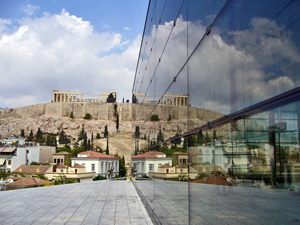 Located in the historic area of Makryianni, the Museum stands some 300 meters (980 feet) southeast of the Parthenon. The top floor (Parthenon Gallery) offers a 360-degree panoramic view of the Acropolis and modern Athens. Located in the historic area of Makryianni, the Museum stands some 300 meters (980 feet) southeast of the Parthenon. The top floor (Parthenon Gallery) offers a 360-degree panoramic view of the Acropolis and modern Athens.
The Museum is entered from the Dionysios Areopagitou pedestrian street, which links it to the Acropolis and other key archeological sites in Athens. |
|
 |
 |
 |
|
 |
|
| Program |
 |
|
 |
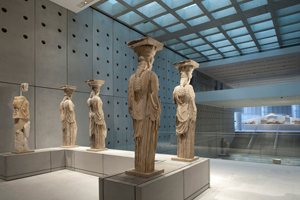 With exhibition space of more than 14,000 square meters (150,000 square feet) and a full range of modern visitor amenities, the New Acropolis Museum will tell the complete story of life on the Athenian Acropolis and its surroundings. It will do so by uniting collections that are currently dispersed in multiple institutions, including the outdated Acropolis Museum (built in the 19th century with gallery space of 1,450 square meters, or 15,500 square feet). The rich collections will provide visitors with a comprehensive picture of the human presence on the Acropolis, from pre-historic times through late Antiquity. Integral to this program is the display of an archeological excavation on the site of the Museum itself: ruins from the 4th through 7th centuries A.D., left intact and protected beneath the building and made visible through the first floor. With exhibition space of more than 14,000 square meters (150,000 square feet) and a full range of modern visitor amenities, the New Acropolis Museum will tell the complete story of life on the Athenian Acropolis and its surroundings. It will do so by uniting collections that are currently dispersed in multiple institutions, including the outdated Acropolis Museum (built in the 19th century with gallery space of 1,450 square meters, or 15,500 square feet). The rich collections will provide visitors with a comprehensive picture of the human presence on the Acropolis, from pre-historic times through late Antiquity. Integral to this program is the display of an archeological excavation on the site of the Museum itself: ruins from the 4th through 7th centuries A.D., left intact and protected beneath the building and made visible through the first floor.
Other program facilities include a 200-seat auditorium. |
|
 |
 |
 |
|
 |
|
| Architectural Description |
 |
|
 |
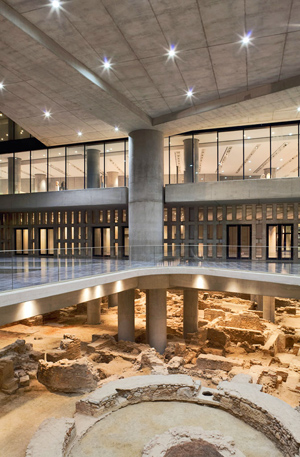 Three concepts turn the constraints and circumstances of the site into an architectural opportunity, offering a simple and precise museum with the mathematical and conceptual clarity of ancient Greece. Three concepts turn the constraints and circumstances of the site into an architectural opportunity, offering a simple and precise museum with the mathematical and conceptual clarity of ancient Greece.
First, the conditions animating the New Acropolis Museum revolve around natural light, more than in any other type of museum. Light for the exhibition of sculpture differs from the light involved in displaying paintings or drawings. The new exhibition spaces could be described as an museum of ambient natural light, concerned with the presentation of sculptural objects within it, whose display changes throughout the course of the day.
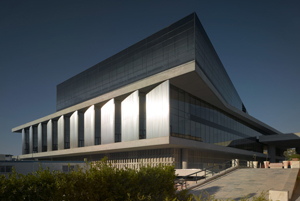 Second, the visitor’s route through the museum forms a clear three-dimensional loop, affording an architectural promenade with a rich spatial experience that extends from the archeological excavations to the Parthenon Marbles and back through the Roman period. Movement in and through time is an important aspect of architecture, and of this museum in particular. With over 10,000 visitors daily, the sequence of movement through the museum artifacts is designed to be of the utmost clarity. Third and finally, the building is divided into a base, middle, and top, which are designed around the specific needs of each part of the building. The base of the museum floats over the existing archaeological excavations on pilotis to protect and consecrate the site with a network of columns placed in careful negotiation with experts so as not to disturb sensitive archaeological work. The orientation gently rotates as it rises so that the main galleries in the middle form a double-height trapezoidal plate that accommodates the galleries from the Archaic period to the Roman Empire, and is shaped to respond to the contemporary street grid. Second, the visitor’s route through the museum forms a clear three-dimensional loop, affording an architectural promenade with a rich spatial experience that extends from the archeological excavations to the Parthenon Marbles and back through the Roman period. Movement in and through time is an important aspect of architecture, and of this museum in particular. With over 10,000 visitors daily, the sequence of movement through the museum artifacts is designed to be of the utmost clarity. Third and finally, the building is divided into a base, middle, and top, which are designed around the specific needs of each part of the building. The base of the museum floats over the existing archaeological excavations on pilotis to protect and consecrate the site with a network of columns placed in careful negotiation with experts so as not to disturb sensitive archaeological work. The orientation gently rotates as it rises so that the main galleries in the middle form a double-height trapezoidal plate that accommodates the galleries from the Archaic period to the Roman Empire, and is shaped to respond to the contemporary street grid.
The top, which is made up of the rectangular Parthenon Gallery arranged around an indoor court, rotates gently again to orient the Marbles exactly as they were placed at the Parthenon centuries ago.
The glass enclosure provides ideal light for sculpture in direct view to and from the Acropolis while protecting the gallery against excessive heat and light, thanks to the most contemporary glass technology.
The three major materials of the Museum are glass for the facades and some of the floors, concrete for the core and the columns, and marble for some floors. The east and west facades and the Parthenon Gallery columns are made of steel. |
|
 |
 |
 |
|
 |
|
|
|
 |
|
 |
 |
 |
 |
 |
 |
 |
MATERIALS |
 |
|
|
 |
|
 |
 |
 |
 |
 |
|
reinforced concrete, glass, steel, marble 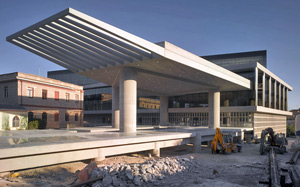 Structure: Reinforced concrete and steel Structure: Reinforced concrete and steel
Glass Façade: Purified ‘low iron’ glass with an invisible selective UV coating and printed frit
Inner Core: Precast and cast-in-place concrete with acoustical dampening perforations
Skylights: Frosted glass panels
Railings: Glass panels with steel handrails
Floors: Beige marble for galleries; dark marble for circulation; heat strengthened, laminated safety glass with textured dots to prevent slippage
Displays: Marble pedestals, glass vitrines, and steel niches
|
|
 |
 |
 |
 |
LOCATION |
 |
|
|
 |
|
 |
 |
 |

|
 |

|
Continent |
|
 |
|
Nation |
|
 |
|
Region |
|
 |
|
Regional district |
|
 |
|
Town |
|
 |
|
Address |
|
 |
|
|
|
 |
|
Telephone |
|
 |
|
Website |
|
 |
|
E-mail |
|
 |
info@theacropolismuseum.gr |
|
 |
 |
 |
 |
MAP |
 |
|
|
 |
|
 |
 |
 |
| |
 |
|
 |
 |
 |
 |
|
TYPOLOGY |
 |
|
|
 |
|
 |
 |
 |
Main |
 |
|
 |
ARCHITECTURE | Museums and buildings for exhibitions
Archaeology museums
| |
|
|
 |
|
Additional |
 |
|
 |
ARCHITECTURE | Commercial buildings
Shops
Bars, cafeterias
Buildings for recreational activities
Theatres
Urban equipment and structures for public areas
Panoramic structures, belvederes
|
LANDSCAPE ARCHITECTURE AND NATURAL ENVIRONMENTS | Landscape architecture
Public gardens
| |
 |
 |
 |
 |
CHRONOLOGY |
 |
|
|
 |
|
 |
 |
 |
Project |
 |
|
 |
| 
 |
2001 - 2002
project winner of competition
|
|
Realisation |
 |
|
 |
| 
 |
2003 - 2009 |
|
 |
 |
 |
 |
AWARDS |
 |
|
|
 |
|
 |
 |
 |
| 2011 |
 |
|
 |
Honor Award for Architecture
AIA American Institute of Architects |
|
 |
 |
 |
 |
 |
 |
 |
BIBILIOGRAPHIC REFERENCES |
 |
|
|
 |
|
 |
 |
 |
|
 |
| "New Acropolis Museum, Athens, Greece. Bernard Tschumi Architects", L'Arca 265, gennaio/january 2011 [La scena della cultura / The culture scene], pp. 72-79 |
|
|
| Antonello Marotta, "Nuovo Museo dell'Acropoli ad Atene, Grecia / New Acropolis Museum, Athens, Greece", L'industria delle costruzioni 414, luglio-agosto/july-august 2010 [Archologie], pp. 26-35, cover |
|
|
| "Nuevo Museo de la Acrópolis, Atenas (Grecia) /New Acropolis Museum, Athens (Greece). Bernard Tschumi", AV MonografÃas/Monographs 139 [Museos del mundo/Museums of the World], IX-X 2009, "Un viaje en doce etapas/A Journey in Twelve Stages" pp. 36-45 |
|
|
| David Neustein, "Hallowed ground: Acropolis Museum, Athens", Monument 92, august-september 2009 [The secret evolution of architecture: public projects that take us to the next level], pp. 34-37 |
|
|
| "Tschumi ad Atene", Modulo 352, giugno 2009, "Attualità /Eventi" p. 487 |
|
|
| David Dillon, "Tschumi-designed Acropolis museum opens", Architectural Record 6/2009, june 2009, p. 24 |
|
|
| Alexandra Stara, "The new Acropolis Museum: banal, sloppy, badly detailed sophistry", Architectural Review 1348, june 2009, pp. 24-26 |
|
|
| Beatrice Galilee, "New Acropolis Museum. Bernard Tschumi Architects", Icon 67, january 2009, pp. 60-66 |
|
|
| "Trick of the light" in Design Yearbook 2009. A glimpse into Arup’s creative world, Arup, London 2009, pp. 6-7 |
|
|
| Peter Kelly, "New Acropolis Museum, Athens. Bernard Tschumi", Blueprint 260, november 2007, pp. 76-80 |
|
|
| Joann Gonchar, "A temple to transparency rises in Athens: a technically challenging and long-anticipated museum devoted to the display of ancient artifacts nears completion at the foot of Greece's most sacred mount", Architectural Record 6/2007, june 2007, "Architectural technology" pp. 176-179 (165-184) |
|
|
| Alexander Antoniades, "Despite protest, Acropolis Museum construction continues", Architectural Record 9/2003, september 2003, p. 42 |
|
 |
 |
 |
 |
 |
 |
 |
CLIENT |
 |
|
|
 |
|
 |
 |
 |
| |
 |
Organization for the Construction of the New Acropolis Museum
Hellenic Republic
European Regional Development Fund (ERDF) |
|
 |
 |
 |
 |
AMOUNT |
 |
|
|
 |
|
 |
 |
 |
| |
 |
|
 |
 |
 |
 |
DIMENSIONAL
DATA |
 |
|
|
 |
|
 |
 |
 |
| Surface |
 |
|
 |
site sq.m. 23,000
floor sq.m. 21,000
exhibition space sq.m. 14,000
|
|
| Floors |
 |
|
 |
3 main levels
2 intermediate levels |
|
| Dimensions |
 |
|
 |
Parthenon Gallery m. 39 x 84
Frieze m. 21 x 58 |
|
| Capacity |
 |
|
 |
|
| Number |
 |
|
 |
43 columns in excavations
28 columns in Archaic Gallery
348 glass panels in Parthenon Gallery |
|
 |
 |
 |
 |
STRUCTURES |
 |
|
|
 |
|
 |
 |
 |
| |
 |
|
 |
 |
 |
 |
STAFF |
 |
|
|
 |
|
 |
 |
 |
Project  |
 |
| Bernard Tschumi Architects |
|
|
 |
|
|
 |
|
Design concept |
 |
|
Project architect |
 |
|
Design team |
 |
| Adam Dayem, Aristotelis Dimitrakopoulos, Jane Kim, Eva Sopeoglou, Kim Starr, Anne Save de Beaurecueil, Jonathan Chace, Robert Holton, Valentin Bontjes van Beek, Liz Kim, Daniel Holguin, Kriti Siderakis, Michaela Metcalfe, Justin Moore, Joel Aviles, Georgia Papadavid, Allis Chee, Thomas Goodwill, Véronique Descharrières, Christina Devizzi |
|
Associate architect |
 |
Michael Photiadis, ARSY
George Kriparakos, Nikos Balkalbassis, Philippos Photiadis, Jaimie Peel, Niki Plevri, Maria Sarafidou, Makis Grivas, Elena Voutsina, Manoulis Economou, Elena Voutsina, Manoulis Economou, Dimitris Kosmas |
|
Mechanical engineer |
 |
|
Electrical engineer |
 |
|
Civil engineer |
 |
Michanniki Geostatik
Arup, New York |
|
Lighting engineer |
 |
|
Glazing consultant |
 |
| Hugh Dutton Associates (HDA) |
|
General contractor |
 |
|
 |
 |
 |
 |
CREDITS |
 |
|
|
 |
|
 |
 |
 |
| |
 |
Photos © Christian Richters, Peter Mauss/Esto, Nikos Daniilidis, Bernard Tschumi Architects
Text edited by Bernard Tschumi Architects
Courtesy by Bernard Tschumi Architects
|
|
 |
  |
 |
|
|